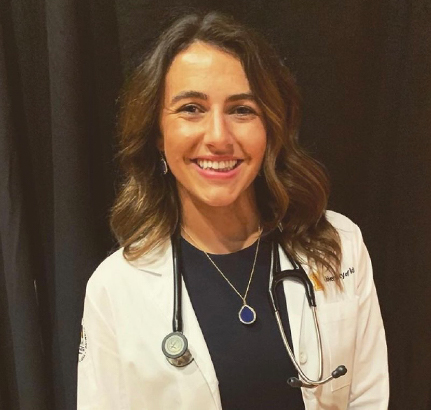
“When I think about the physician I want to be,” Christina says, “I want my patients to be in control, to make changes they can realistically do.”

“When I think about the physician I want to be,” Christina says, “I want my patients to be in control, to make changes they can realistically do.”
It was a typically frigid winter in Coeur d’Alene, Idaho. Before starting medical school, Christina Gibbs volunteered with the Heritage Street Medicine Team’s mobile health clinic. Now a second-year medical student in the University of Washington School of Medicine’s Idaho program, she looks back on that experience and remembers one man they couldn’t help.
“I saw a guy sleeping under a dumpster,” the Kellogg, Idaho, native says. “He lived with so much social anxiety that he wouldn’t go into the warming shelter. Because of his mental health, he couldn’t use the resources we offered.” Although the clinic partnered with a soup kitchen and saw anyone who needed care, the man remained out in the cold.
It was the beginning of Gibbs’ growing understanding of social determinants of health, disparities and challenges related to what care people can realistically access. While some problems stem from a lack of services, other care delivery challenges persist even when healthcare is free and brought directly to the people who need it most.
Her takeaway? “We don’t get to go into medical school and then fix everyone’s problem.” But rather than being defeated by this realization, Gibbs is motivated to better understand how her patients’ lived experiences affect their health decisions.
“What if you have diabetes, but you can’t afford insulin because you have to put food on the table for your kids?” she asks. “I don’t want to be the provider who says, ‘You need to be doing this, no excuses.’” Instead, she recognizes that people face choices.
“When I think about the physician I want to be,” she says, “I want my patients to be in control, to make changes they can realistically do.”
In the same way, Gibbs recognizes her own limitations. “The world will always try to take more than you can give,” she says. “It’s hard for me. I want to help anyone who needs it.” But part of her medical-school education includes learning to set boundaries. As the wellness representative for her class, she makes it a priority to be sure she and her classmates attend to their emotional, spiritual and physical well-being.
At the same time, as she surmounts challenge after challenge in medical school, Gibbs sees an incredible expansion in her capacity to give. Part of her curriculum includes self-reflection about these changes. Gibbs likes to use the teacup-and-saucer analogy she heard in a TED talk; the teacup represents the amount of energy people need to take care of themselves. Only when it overflows onto the saucer do they have enough energy to give to others.
“At the beginning, I couldn’t treat people eight hours a day. I was excited about growing my cup to get to that level,” she says.
Being a member of WWAMI, the School of Medicine’s unique multi-state medical education program, helps her do just that. Serving Washington, Wyoming, Alaska, Montana and Idaho, the program allows Gibbs to gain the experience she needs to serve her home state. “I love the WWAMI Idaho team. The staff are invested and care so much,” she says. “It’s not, ‘If I get into medical school, everything is going to fall into place,’ but rather it’s the relationships that sustain you, that fill you up at the end of the day.” The faculty also know how to push students to expand their limits.
“The thing about challenges and growing is that it’s super uncomfortable the entire time,” says Gibbs. “But it’s also exciting. I can already look back and see how much more pressure I can handle, and I look forward to continued growth in my future.”
“At the beginning, I couldn’t treat people eight hours a day. I was excited about growing my cup to get to that level.”
"I'm excited that Idaho cares enough about putting more Idaho people like me into healthcare. I have a huge desire to come back."
Both of Gibbs’ parents work in healthcare. Inspired by their volunteerism and service orientation, Gibbs wants to return to a small town in Idaho with the skills and capacity to support her community in whatever ways it needs her to.
“Kellogg has 2,200 people, with around 20% in Shoshone County living below the poverty line,” she says. “Free and reduced-price lunch is a normal thing.” Scholarships and other financial aid can bring educational dreams within reach for students like Gibbs. “I’m excited that Idaho cares enough about putting more Idaho people like me into healthcare. I have a huge desire to come back,” she says.
Having volunteered in Haiti during her undergraduate years, she also sees a future full of international trips where she can put her skills to work. Donors who have contributed to the scholarships she’s received make this future more attainable.
“I can’t give from an empty cup in the same way I can’t give from an empty pocket,” says Gibbs. “I want to volunteer in my community and throughout the world, offering care to those who can’t afford it, but I have to make sure I can afford it. These scholarships give me more time in my career to give back.”
Written by Alice Skipton
If you’d like to help students like Christina achieve their goals of addressing healthcare disparities and caring for our communities, make a gift to support scholarships at UW Medicine.